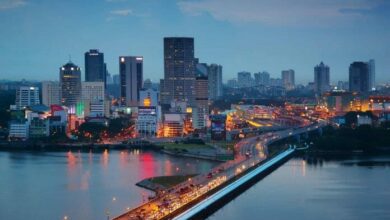Anwar defends BlackRock role in RM12 billion airport privatisation amid Israel protests

[ad_1]
MALAYSIAN Prime Minister Anwar Ibrahim has been a fierce critic of Israel over its war against Hamas. Now, he’s resisting pressure from his critics to refuse a RM12.3 billion (S$3.5 billion) Malaysian airports privatisation deal involving BlackRock over its ties to Israel.
Anwar told parliament this week that it was “not realistic” to cut ties with any company for links to Israel.
He also sought to reassure US investors that his government had no issue with BlackRock, which bought Global Infrastructure Partners (GIP) – a member of the consortium taking over Malaysia Airports Holdings.
“The collaboration between Malaysia Airports and GIP for us is critical,” he said at a luncheon hosted by the American Malaysian Chamber of Commerce (AmCham) on Tuesday (Jun 25).
“We made it clear to all members of parliament and it explains our position on investments from overseas, including the US.”
The furore tests the limits of Anwar backing Palestinians and Hamas, which is designated a terrorist organisation by the US and European Union, as he looks to shore up support at home and also court global investors.
A NEWSLETTER FOR YOU
Friday, 8.30 am
Asean Business
Business insights centering on South-east Asia’s fast-growing economies.
Malaysia does not have a trade or diplomatic relationship with Israel.
“A lot of political capital has been spent to defend the deal,” said political analyst Adib Zalkapli, who has tracked Malaysia for over a decade. “There will be serious consequences to Malaysia’s reputation should the government decide to cancel the deal.”
The privatisation deal, which was announced on May 15, valued the airport operator at about US$3.9 billion.
It keeps 70 per cent of the company in Malaysian hands, namely sovereign wealth fund Khazanah Nasional and the Employees Provident Fund. Abu Dhabi Investment Authority and GIP will control the rest.
The view from Anwar’s advisers is that his government cannot afford to be selective in how it treats companies regarding Palestinian issues, as there are other major investors in Malaysia, such as the Vanguard Group, that also have substantial investments in Israel, according to people familiar with the matter.
GIP has been treading carefully. It told Malaysian state media that BlackRock would not be involved in taking Malaysia Airports private, and that GIP’s existing leadership team would “retain full control”.
BlackRock is among the biggest investors in some of Malaysia’s largest companies, with total holdings worth nearly US$5.8 billion in equities and government bonds, according to data compiled by Bloomberg.
Khazanah and BlackRock did not respond to Bloomberg requests for comment.
Boycotts
The campaign against BlackRock first emerged from the boycott, divestment and sanctions (BDS) movement against Israel, which came to the fore in the US this year.
Students in the country pushed elite American universities to cut their investments in anything tied to Israel and the weapons that fuel the war in Gaza. However, university administrators, donors and lawmakers have rejected it.
The movement has garnered support in Malaysia, where there is a strong anti-Israel sentiment in the Muslim-majority country. Boycotts of global brands, such as Starbucks, KFC and Pizza Hut, for perceived links to Israel have hurt local franchises in, as well as jobs.
“Any company with strong ties with Israel is a potential target of our campaigns,” said Nazari Ismail, chairman of the Malaysian chapter of BDS.
However, it would be impossible to stop BlackRock from buying shares in the country’s open market, Ismail added.
The protest against the deal has also found traction in the Malay-Muslim opposition, ahead of a local election on Jul 6, with politicians describing Anwar as “America’s adopted child”.
A minister was reported as saying that the deal was not unanimously endorsed by the prime minister’s Cabinet, signaling some unease within his coalition.
At the AmCham Malaysia luncheon, Anwar pushed the view that the deal had been politicised.
The prime minister saw the BlackRock issue as “rancorous at the local level, at the by-election with people casting aspersions and allegations”. BLOOMBERG




